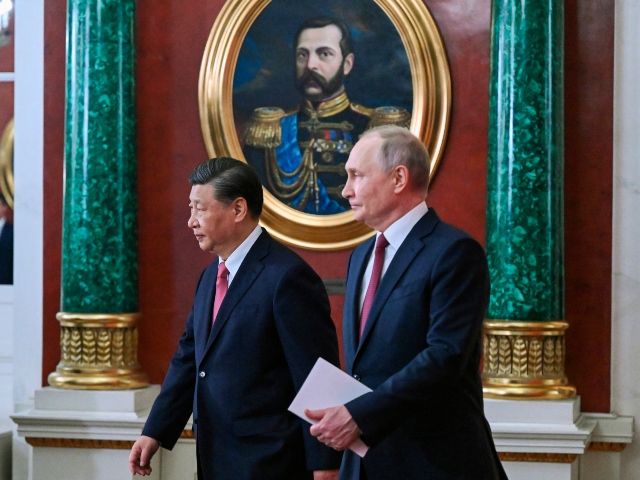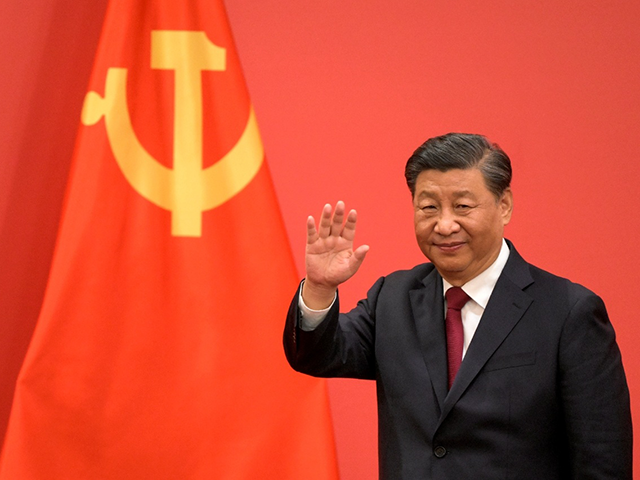Ukrainian President Volodymyr Zelensky used the opportunity of an interview with the Associated Press (AP) on Wednesday to once again invite communist Chinese dictator Xi Jinping to speak to him directly.
Zelensky told the AP that, while he had maintained friendly ties to Xi prior to 2022, he had not had the opportunity to speak to the tyrant after Russia launched its “special operation” to oust Zelensky from his democratically elected post a little over a year ago.
China formally proclaims itself a “neutral” country in the conflict, but is one of Russia’s closest allies on the international stage and conspicuously maintains high-level conversations with the Russian government. Xi Jinping personally visited Moscow for extended talks with leader Vladimir Putin last week.
While boasting of “best ever” diplomatic ties with Russia, China has also historically maintained friendly ties with Ukraine. Ukraine is a member of China’s Belt and Road Initiative (BRI), its global infrastructure plan that ensnares poor countries in predatory loans intended to be used to pay Chinese contractors to build infrastructure projects. The Communist Party has maintained some communication with the Ukrainian government – Ukrainian Foreign Minister Dmytro Kuleba discussed the invasion with his Chinese counterpart Qin Gang this month – and Putin himself admitted in public remarks that Xi Jinping had expressed “concerns” about Russia’s handling of its assault during their last in-person meeting in September.
“China is concerned that the crisis has dragged on and escalated and may even spiral out of control, and hopes that the relevant parties will stay cool-headed and rational, exercise restraint, resume peace talks as soon as possible,” Qin said, according to the Chinese Foreign Ministry, following his conversation with Kuleba “and return to the track of political settlement.”
Beijing has nonetheless opted to keep Zelensky himself at arm’s length, however, a distance the Ukrainian president told AP he hoped to bridge in the near future.
“We are ready to see him here,” Zelensky said of Xi. “I want to speak with him. I had contact with him before full-scale war. But during all this year, more than one year, I didn’t have.”
Zelensky made the remark in an extended conversation on a cross-country train ride to “ceremonies marking the one-year anniversary of the liberation of towns in the Sumy region and visits with troops stationed at front-line positions near Zaporizhzhia,” the news agency detailed.
Elsewhere in the conversation, Zelensky expressed concern that any Ukrainian military losses, particularly in the ongoing battle to control the territory of Bakhmut, could result in pressure on his government to accept a truce to end hostilities.
“Our society will feel tired,” he lamented, in the event of a defeat in Bakhmut. “Our society will push me to have [to] compromise with them.”
Zelensky’s invitation to Xi followed remarks last week from top adviser Mykhailo Podolyak claiming that “preparatory work” was underway for Xi to speak to Zelensky directly. Podolyak admitted that the work had “not yet reached any final stage,” according to the Ukrainian state outlet Ukrinform.
The Chinese Foreign Ministry, responding to the AP interview on Wednesday, appeared entirely unaware of any such preparatory work. Spokeswoman Mao Ning denied that Xi had received any formal invitation to Kyiv.
“On the Ukraine issue, China has maintained communication with all relevant parties, including Ukraine. I have no information on the specifics you asked about,” Mao told reporters twice during her daily briefing on Wednesday. Asked directly if Xi had received a “formal invitation” from Zelensky, Mao said, “I’m not aware of that.”
The Kremlin, meanwhile, endeavored on Wednesday to appear to have no influence on Chinese diplomatic operations regarding Ukraine.
“We are familiar with the balanced position of China, we highly praise it and believe that the Chinese leader decides on his own the expediency of certain contacts,” top Putin spokesman Dmitry Peskov told reporters. “We have no right to advise on this issue.”
Zelensky has repeatedly extended similar invitations to discussions to Xi and received little more than silence.
“I would like to talk directly. I had one conversation with [President] Xi Jinping that was a year ago,” Zelensky told the Hong Kong-based South China Morning Post in August. “Since the beginning of the large-scale aggression on February 24, we have asked officially for a conversation, but we (haven’t had) any conversation with China even though I believe that would be helpful.”
During that interview, Zelensky said that he hoped “Chinese businesses” would come to Ukraine and help rebuild after the Russian invasion concluded.
More recently, in January, Ukrainian First Lady Olena Zelenska handed a personal letter from her husband to the Chinese delegation at the World Economic Forum in Davos, Switzerland, meant for Xi Jinping.
“It was a gesture and invitation to dialogue and I hope very much that there will be a response to this invitation,” Zelenska told reporters at the time.
The Chinese government never confirmed publicly if Xi received or read the letter and did not respond in any public way.
Beijing’s policy of ignoring Zelensky entirely has come under increased pressure since Xi’s appearance in Moscow last week, in which he indicated that he hoped to see China take on the mantle of guardian of “the world order,” essentially proclaiming China an ideal arbiter between the two countries.

Russian President Vladimir Putin, right, and Chinese President Xi Jinping arrive to attend a signing ceremony following their talks at The Grand Kremlin Palace, in Moscow, Russia, Tuesday, March 21, 2023. (Grigory Sysoyev, Sputnik, Kremlin Pool Photo via AP)
The Chinese state propaganda newspaper Global Times more explicitly proclaimed that Xi’s visit showed the world that China was the world’s “hope for a peaceful solution of the complicated ongoing crisis.”
The administration of far-left American President Joe Biden used the opportunity of Xi’s Russia visit to invite the Chinese dictator to speak personally to Zelensky.
“Now, look, if — if he’s [Xi] willing to talk to President Zelensky and willing to get the other side,” National Security Council (NSC) Coordinator for Strategic Communications John Kirby told reporters at the White House, “if any future potential negotiation can incorporate Ukrainian views and perspectives and can be achieved and pursued with Ukraine … then that’s something that could be seen as impartial.”
“If President Zelensky — if there’s a path put forward that President Zelensky can get behind and he believes will help lead to a ‘just peace,’ as he refers to it, then he’ll find no better friend in that effort than the United States,” Kirby emphasized.
Follow Frances Martel on Facebook and Twitter.

COMMENTS
Please let us know if you're having issues with commenting.